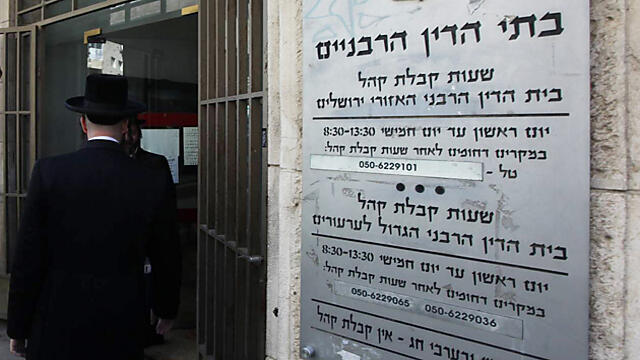Getting your Trinity Audio player ready...
Senior officials in Israel's rabbinical courts prepared a document suggesting legislation for ultra-Orthodox parties to use during coalition negotiations after the April 2019 elections.
and Twitter
The document, which goes against existing regulations on the separation of the rabbinical courts and the political echelon, was obtained by Ynet's sister publication Yedioth Ahronoth.
2 View gallery


L-R: United Torah Judaism leader Yaakov Litzman, Prime Minister Benjamin Netanyahu and National Union head Bezalel Smotrich
(צילום: EPA, יאיר שגיא)
It was sent out from the personal account of the rabbinical courts' legal advisor Rabbi Shimon Yaacovi two weeks after the elections, in an email entitled "Clauses for the government's basic guidelines." It was sent to several members of the ultra-Orthodox parties' negotiators as well as Bezalel Smotrich, the head of the National Union party.
The document contained suggested legislation that the ultra-Orthodox parties should demanded from the government during the coalition talks.
The most noteworthy item was proposed legislation that states that, "the rabbinical courts will have the authority to decide financial cases according to Jewish law, if all sides in the dispute agree."
Similar legislative attempts meant to increase the power and scope of the rabbinical courts beyond divorce and conversion, have previously been stopped in the past by the Supreme Court.
Other items in the document dealt directly with employment conditions for rabbinical court staff, demanding they be equal to those of workers in the civil court system.
Yaacovi also recommends that the government commit to assigning a budget for a new rabbinical court building and the chief rabbinate that is of equal standard to the Supreme Court building.
The legal adviser also sought to increase his own jurisdiction, recommending that he be authorized to appear before the Supreme Court for any injunction involving rabbinical courts without receiving permission from the attorney general.
The attorney general's office declined to comment.
A spokesman for the rabbinical courts denied that there had been any effort to interfere with the political process.
"Attorney Yaacovi was not involved in the coalition negotiations," the spokesman said in response to a query from Yedioth Ahronoth. "He did not and does not provide guidance to members of Knesset."
He added: "A document regarding legislative and budgetary needs of the rabbinical courts was sent to the senior management of the courts as well as to the director-general of the Ministry of Religious Services, as part of documents prepared for a government committee looking into conditions in the various court systems... Copies of the letter were made available to other people as well.


